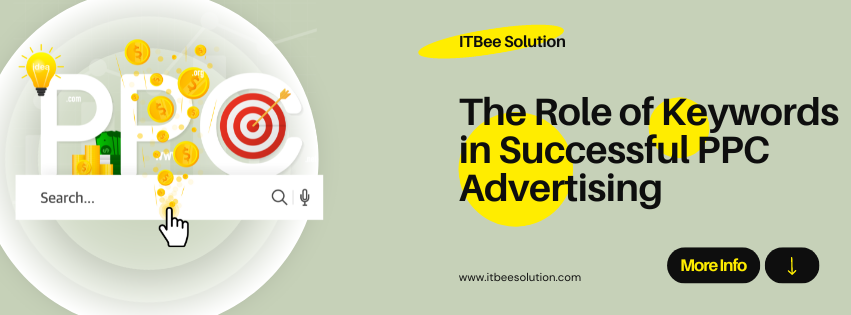
The Role of Keywords in Successful PPC Advertising
Pay-per-click (PPC) advertising has become a cornerstone of digital marketing strategies, allowing businesses to attract targeted traffic, generate leads, and drive sales with measurable results. At the heart of any successful PPC campaign lies the strategic use of keywords. These keywords are the connective tissue that links search intent with the advertisements displayed to users.
This blog explores the pivotal role of keywords in PPC advertising and provides insights into best practices for selecting and optimizing keywords to maximize campaign success.
Basic Guide: Understanding PPC Advertising
Before delving into the specifics of keywords, it’s essential to understand the fundamentals of PPC advertising. PPC is an online advertising model where advertisers pay a fee each time their ad is clicked. Essentially, it’s a way of buying visits to your site rather than earning them organically. The most popular PPC platform is Google Ads, but others like Bing Ads, Facebook Ads, and LinkedIn Ads also offer robust PPC opportunities.
Need to Know: The Significance of Keywords in PPC
Keywords in PPC advertising are the words and phrases that advertisers bid on, aiming to display their ads when users search for those terms. These keywords bridge the gap between what users are searching for and the content advertisers are offering. Here’s why they are crucial:
- Targeted Reach: Keywords allow advertisers to target specific audiences. By choosing relevant keywords, businesses can ensure their ads appear in front of users actively seeking their products or services. This targeted approach enhances the likelihood of converting clicks into customers.
- Cost Efficiency: Effective keyword selection can significantly impact the cost-efficiency of a PPC campaign. Keywords with high relevance and lower competition tend to have lower costs-per-click (CPC), allowing advertisers to stretch their budgets further and achieve better returns on investment (ROI).
- Ad Relevance and Quality Score: In platforms like Google Ads, keywords directly influence the Quality Score, a metric that affects ad placement and cost. High-quality, relevant keywords can improve an ad’s Quality Score, leading to better ad positions and lower CPCs. Google rewards ads that provide a good user experience by offering them premium placements at lower costs.
- User Intent Alignment: Keywords help align ads with user intent. By understanding and leveraging the keywords users employ when searching, advertisers can create more relevant and compelling ad copy that resonates with their target audience, increasing click-through rates (CTR) and conversions.
Keyword Research: The Foundation of PPC Success
Effective keyword research is the cornerstone of any successful PPC campaign. It involves identifying the terms your target audience uses when searching for products or services similar to yours. Here’s a step-by-step approach to conducting keyword research:
- Brainstorming and Seed Keywords: Start by brainstorming a list of seed keywords relevant to your business. These are basic terms related to your products or services. For example, if you run a bakery, seed keywords might include “fresh bread,” “cupcakes,” and “pastries.”
- Utilizing Keyword Research Tools: Leverage keyword research tools like Google Keyword Planner, SEMrush, and Ahrefs to expand your list of keywords. These tools provide insights into search volumes, competition levels, and related keywords, helping you identify valuable terms you might not have considered.
- Analyzing Competitor Keywords: Investigate the keywords your competitors are bidding on. Tools like SpyFu and SimilarWeb can reveal competitor keywords, giving you ideas for your campaign and identifying potential gaps in your keyword strategy.
- Long-Tail Keywords: Incorporate long-tail keywords—phrases that are more specific and less competitive than broad keywords. Although they typically have lower search volumes, long-tail keywords often result in higher conversion rates due to their specificity. For example, instead of “shoes,” use “women’s running shoes for flat feet.”
- Negative Keywords: Identify negative keywords—terms for which you don’t want your ads to appear. This prevents your ads from showing up in irrelevant searches, saving your budget for more relevant clicks. For example, a high-end furniture store might add “cheap” as a negative keyword to avoid attracting bargain hunters.
Read: Better PPC Account Health in 2024: Strategies to avoid modern pitfalls and wasted spend
Optimizing Keywords for PPC Success
Once you’ve conducted thorough keyword research, the next step is optimization. This involves selecting the right keywords, organizing them effectively, and continually refining your strategy based on performance data.
- Keyword Grouping: Organize your keywords into tightly themed ad groups. This improves ad relevance and Quality Score, as each ad group can be tailored to a specific set of keywords. For example, a digital marketing agency might have separate ad groups for “SEO services,” “PPC management,” and “social media marketing.”
- Ad Copy Alignment: Ensure your ad copy closely aligns with your chosen keywords. Including keywords in your ad headlines and descriptions enhances relevance and improves CTR. For example, if your keyword is “affordable wedding venues,” your ad headline might read “Affordable Wedding Venues – Book Your Dream Venue Today!”
- Bid Management: Monitor and adjust your keyword bids regularly. Increase bids for high-performing keywords to maximize visibility and reduce bids for underperforming ones to manage costs. Automated bidding strategies offered by PPC platforms can also help optimize bids based on your goals.
- Performance Tracking and Analysis: Use analytics tools to track the performance of your keywords. Monitor metrics such as CTR, conversion rate, and CPC. Analyze this data to identify which keywords are driving results and which ones need adjustment. Continuous optimization is key to maintaining a successful PPC campaign.
- A/B Testing: Conduct A/B testing to compare different versions of your ads and landing pages. Test variations in ad copy, keyword usage, and landing page design to determine what resonates best with your audience. Use the insights gained to refine your strategy further.
Final Thoughts
Keywords are the linchpin of successful PPC advertising, serving as the critical link between user intent and advertiser offerings. Through meticulous keyword research, strategic selection, and continuous optimization, businesses can enhance their PPC campaigns’ effectiveness, drive targeted traffic, and achieve superior ROI.
As the digital landscape evolves, staying attuned to keyword trends and user behavior will remain essential for sustaining PPC success. By mastering the art and science of keyword management, advertisers can harness the full potential of PPC advertising to achieve their marketing goals.

